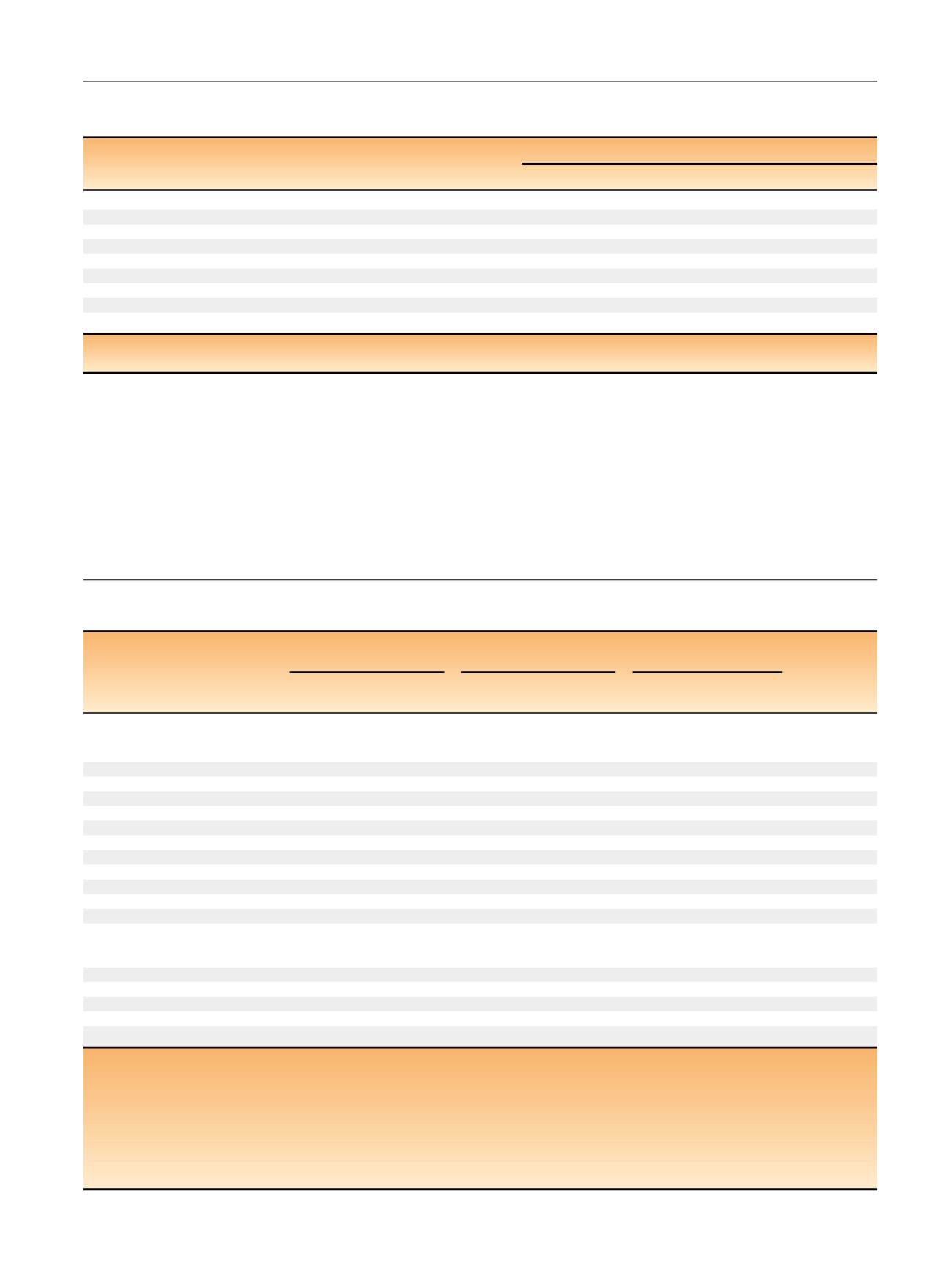

Gleason scores and were less likely to die from prostate
cancer, CVD, and all causes (data not shown).
Walking contributed 73% of total MET-h/wk in both pre-
and postdiagnosis cohorts. The three types of vigorous
activity combined accounted for only 10% of all MET-h/wk
( Table 2).
Prediagnosis recreational PA was not associated with
PCSM in multivariable-adjusted model
( Table 3). In a
separate multivariable-adjusted model further controlling
for other recreational PA, prediagnosis walking had a
suggestive inverse association with overall PCSM (walking
for 7 h vs 1–3 h/wk, HR: 0.85, 95% CI: 0.64–1.14,
p
-
trend = 0.07). Other recreational PA was not associated with
PCSM. In stratified analyses, there was a statistically
significant inverse association between prediagnosis recre-
ational PA and PCSM among men with lower-risk tumors
Table 2 – Contribution of moderate to vigorous activity to total MET-h/wk among men diagnosed with nonmetastatic prostate cancer in the
CPS-II Nutrition Cohort
a[1_TD$DIFF]
Type of recreational physical activity
MET value
Prediagnosis (
N
= 6631)
Postdiagnosis (
N
= 5012)
% of total MET-h/wk
% of total MET-h/wk
Moderate-intensity activity
Walking
3.5
73
73
Bicycling
4
10
11
Aerobics
4.5
5
6
Dancing
3.5
2
2
Vigorous-intensity activity
Jogging or running
7
3
2
Lap swimming
7
3
3
Tennis or racquetball
6
4
3
[8_TD$DIFF]
CPS = Cancer Prevention Study; MET = metabolic equivalent task.
a
Not including men with zero MET-h/wk.
Table 3 – Prostate cancer–specific mortality by prediagnosis recreational physical activity among men diagnosed with nonmetastatic
prostate cancer in the CPS-II Nutrition Cohort (1992–2012)
Median
MET-h/wk
All prostate
cancer
aLower-risk prostate
cancer
bHigh-risk prostate
cancer
cp
interaction
Deaths/
person-yr
HR
(95% CI)
Deaths/
person-yr
HR
(95% CI)
Deaths/
person-yr
HR
(95% CI)
Total recreational
physical activity
d[9_TD$DIFF]
(MET-h/wk)
[10_TD$DIFF]
0.02
<
3.5
0
71/8151
1.29 (0.96–1.73) 22/5400
0.83 (0.51–1.36) 37/1654 1.77 (1.10–2.84)
3.5–
<
8.75
3.5
156/24 654 1.00 (ref.)
80/17 117 1.00 (ref.)
53/4146 1.00 (ref.)
8.75–
<
17.5
14
89/16 631 0.96 (0.73–1.25) 44/11 900 0.82 (0.56–1.19) 36/2678 1.34 (0.84–2.15)
17.5+
25.9
138/26 131 0.95 (0.75–1.21) 48/19 104 0.63 (0.43–0.91) 69/4359 1.41 (0.95–2.09)
p
trend
0.2
0.03
0.6
Walking
d , e (h/wk)
0.008
<
1
0
94/12 301 1.10 (0.85–1.42) 27/8193
0.71 (0.46–1.11) 50/2405 1.44 (0.96–2.15)
1–3
3.5
202/32 734 1.00 (ref.)
102/23 194 1.00 (ref.)
75/5441 1.00 (ref.)
4–6
14
93/18 014 0.85 (0.66–1.10) 45/12 736 0.79 (0.55–1.13) 32/3007 0.82 (0.53–1.28)
7
24.5
65/12 520 0.85 (0.64–1.14) 20/9398
0.53 (0.33–0.86) 38/1983 1.33 (0.87–2.04)
p
trend
0.07
0.04
0.9
Other recreational
physical activity
d[11_TD$DIFF]
, f(MET-h/wk)
0.01
<
3.5
0
265/43 666 0.90 (0.72–1.13) 125/30 890 1.29 (0.89–1.87) 101/7291 0.66 (0.46–0.94)
3.5–
<
8.75
4.5
114/17 902 1.00 (ref.)
41/12 518 1.00 (ref.)
56/3113 1.00 (ref.)
8.75–
<
17.5
12.5
40/7151
1.00 (0.69–1.44) 12/5140
0.90 (0.47–1.73) 25/1295 1.17 (0.70–1.97)
17.5+
28
35/6849
0.87 (0.59–1.29) 16/4973
1.23 (0.68–2.22) 13/1137 0.60 (0.32–1.15)
p
trend
1.0
0.6
0.7
CPS = Cancer Prevention Study; HR = hazard ratio; CI = confidence interval; MET = metabolic equivalent task; ref. = reference.
a
Includes T1–T2 cancers with unknown Gleason score not included in lower- or high-risk categories.
b
Defined as Gleason score 2–7 and T1–T2.
c
Defined as Gleason score 8–10 or T3–T4 or nodal involvement.
d
Adjusted for age at diagnosis, race, calendar year of diagnosis, tumor extent, nodal involvement, Gleason score, education, family history of prostate cancer,
history of prediagnosis prostate-specific antigen testing, prediagnosis cardiovascular disease history, prediagnosis body mass index, prediagnosis smoking status,
prediagnosis multivitamin use, prediagnosis red meat and processed meat intake, prediagnosis fish intake, and prediagnosis sitting time.
e
Further adjusted for other recreational physical activity.
f
MET hours of other physical activity is calculated as total recreational MET hours minus walking MET hours; model further adjusted for walking.
E U R O P E A N U R O L O G Y 7 2 ( 2 0 1 7 ) 9 3 1 – 9 3 9
935
















